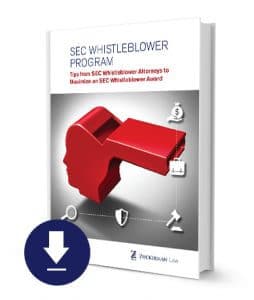Yes. The SEC firmly rejects any employer’s attempt to impede an employee’s communication with the SEC about a possible securities-law violation by using instruments such as:
- overly broad confidentiality provisions in severance or employee agreements;
- waivers of the right to receive a whistleblower reward; or
- agreements to notify the company’s legal counsel before disclosing information to government agencies.
However, SEC whistleblowers should be careful not to submit to the SEC materials protected by the attorney-client privilege.
In August 2016, the SEC issued a cease-and-desist order against BlueLinx Holdings Inc. for using overly broad confidentiality provisions in severance agreements that would likely deter employees from blowing the whistle. In particular, to receive severance BlueLinx employees had to waive the right to recover a whistleblower award and agree to notify the company’s legal counsel before disclosing information to government agencies pursuant to legal process. The SEC’s order imposed a $265,000 penalty on BlueLinx because these requirements violated Dodd-Frank Act Rule 21F-17.
In December 2016, the SEC fined SandRidge Energy Inc. $1.4 million for failing to include a “carve out” in severance agreements that allows employees to report claims to the SEC.
For more information about whistleblower rewards and bounties, contact the SEC whistleblower lawyers at Zuckerman Law at 202-262-8959.
The SEC has taken the following enforcement actions against companies due to their policies or practices that impede reporting to the SEC:
- SEC v. Collector’s Coffee, Inc. (d/b/a Collectors Cafe), and Mykalai Kontilai, 19-cv-04355 (November 4, 2019)
- In the Matter of Homestreet, Inc. and Darrell Van Amen, File No. 3-17801 (January 19, 2017)
- In the Matter of Blackrock, Inc., File No. 3-17786 (January 17, 2017)
- In the Matter of SandRidge Energy, Inc., File No. 3-17739 (December 20, 2016)
- In the Matter of NeuStar, Inc., File No. 3-17736 (December 19, 2016)
- In the Matter of Anheuser-Busch InBev SA/NV, File No. 3-17586 (September 28, 2016)
- In the Matter of Health Net, Inc., File No. 3-17396 (August 16, 2016)
- In the Matter of BlueLinx Holdings Inc., File No. 3-17371 (August 10, 2016)
- In the Matter of Merrill Lynch, Pierce, Fenner & Smith Incorporated and Merrill Lynch Professional Clearing Corp., File No. 3-17312 (June 23, 2016)
- In the Matter of KBR, Inc., File No. 3-16466 (April 1, 2015)
Unlawful Gag Provisions
Click below to hear SEC whistleblower lawyer Matt Stock’s tips for SEC whistleblowers:
To learn more about the SEC Whistleblower Program, download Zuckerman Law’s eBook: SEC Whistleblower Program: Tips from SEC Whistleblower Attorneys to Maximize an SEC Whistleblower Award:
As discussed in our articles, the SEC whistleblower program has become a very effective enforcement tool for the SEC. But very few whistleblowers have received awards, which underscores the importance of having experienced counsel represent a whistleblower effectively at the SEC.
- MarketWatch: More than 33,000 tips, $2.5 billion in financial remedies and $500 million in awards to investors — the SEC’s whistleblower program turns 10 years old today
- Going Concern: Here Are 6 Reasons Why the SEC Whistleblower Program Is Successful
- National Law Review: 5 Ways that Experienced SEC Whistleblower Law Firms Can Effectively Advocate for Whistleblowers
- D&O Diary: How the SEC Whistleblower Program Has Changed Corporate Compliance and SEC Enforcement
- Going Concern: Sarbanes-Oxley 15 Years Later: Accountants Need to Speak Up Now More Than Ever.
- Accounting Today: Whistleblower Protections and Incentives for Auditors and Accountants.
- The Compliance and Ethics Blog: Shkreli Trial Reveals the Challenges Faced by Compliance Whistleblowers.
SEC Whistleblower Lawyers
How to Qualify for an SEC Whistleblower Award
SEC Whistleblower Rewards
whistleblower_lawyers_012017_infographic
Yes, as a matter of fact, the SEC has taken a very strong stance against employers who attempt to impede employees from going to the SEC with information. This includes things such as: employers can not include overly broad confidentiality provisions in severance agreements or employment agreements; they cannot require that an employee report first internally to legal counsel, for example, before going to the SEC; and also, they cannot require an employee to wave their right to an award if they do go to the SEC.










